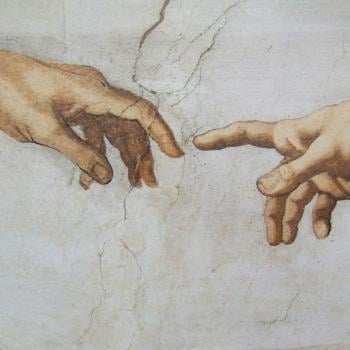
Christianity is a religion of hope. God loves us, and is ready to show us that love, helping us when we need it, while also giving us room to make of ourselves what we want. That is, God’s love grants us both freedom but also mercy and grace if we need them and are willing to accept them when offered. God does not force us to receive any help, but on the other hand, if we find the burden we bear is too great, if the consequences of our actions are beyond what we can deal with by ourselves, God is more than willing to come in and share the burden with us, making sure they do not weigh us down and destroy us.
It is up to us. If and when we stumble and fall into some sort of sin, we should not let such a stumble define who we are. God’s grace is all around us; it makes sure we are able to get back up each and every time we stumble. Indeed, it is better that we are humble and recognize our weakness, to realize that we likely will fall from time to time, so that we do not despair when it happens, for that will help make sure we do not get too proud and becoming unwilling to accept help when we stumble. When we are prideful, we hurt ourselves, making situations such as this far worse than they have to be. For, at times, we need to recognize we cannot do all things ourselves; we need help, just as we would need a crutch if we fell and broke our foot. Pride deceives us and as long as we hold onto it, we will not be able to truly get back up. Thus, St. Antony is known to have suggest that it is far better to be one who constantly stumbles and gets back up than it is to have done some extraordinary feats, become prideful in our accomplishments, and then fall into some grave sin:
The elder Antony said, ‘Many are those who fall and rise up to uprightness. There are some who fall from good actions to polluted things. Therefore, better is the one who falls down and gets back up than one who stands up and then falls down.”[1]
This is one of many reasons why we should not be judging others for their sins, looking down upon them when they stumble when we do not. We do not know their situation. We do not know their struggles. Many people have a difficulty dealing with particular temptations that others do not have; if we experienced what they experienced, we would likely fall as they do. And, if someone constantly stumbles because their sin has become habitual, though it is still a problem for them to work out, their culpability becomes lessened by the habitual nature of the sin. Thus, if they sin, and sin often, but each time, try to resist the sin, and go to God, always seeking God’s merciful love to help them deal with the situation, God will not only forgive them, but help them deal with their situation, making them better persons through their struggles. No matter how many times they fall, God is willing to help them. On the other hand, those who find themselves not afflicted by such temptations, who view themselves as attaining great virtue, and signal that virtue through their actions, and in doing so, grow in pride and judge and condemn others with that pride, they will find that their pride will take over and overcome all the virtue they have attained. They will find themselves in a worse position than those they have judged.
We are to be merciful and loving to others, which is why Jesus said we are to forgive others “seventy times seven,” that is, every time someone truly asks for forgiveness. If we are to forgive those who have done us some wrong, we should also be merciful to those whose sins do us no wrong. This is one of many ways we can represent the love of God to others, and in this way, we will be able to encourage them and help prevent them from falling deep into the pit of despair.
We should, therefore, be humble, not only in the way we show others mercy, but also in the way we show ourselves mercy as well. One of the ways to keep ourselves humble is to remember that the victories we have against sin, as well as the gains we have in virtue, though in part, come from ourselves, also in part come from God and God’s grace. Humility lets us accept such aid, and so, once we embrace humility, we will be able to properly cooperate with grace, and so integrate God’s goodness into our lives. This is how we will truly become holy, and not just with an artificial holiness that will vanish, but with a true holiness that can remain with us throughout eternity. And so, for every good we have done, we should realize there is more good which we can and should do, even as there are more vices for us to fight against and gain victory over with God’s grace:
Abba Antony said, ‘It is not the person who is victorious in one thing only, namely abstinence, nor the person who masters only one of the things that oppose virtue who is better. If abstinence boasts that it is virtuous, a multitude of evils are enemies of it. But the person who is saved must watch over everything because of his enemies and pray that God’s goodness will save him.’[2]
We need to act with right intentions. If we do things for the wrong reasons, even if the thing is objectively good, we contaminate that goodness and hinder it from achieving its proper end. Anger, for example, can motivate us to do things, but as St. Antony also realized, that motivation is wrong, and so the good we achieve is undermined by such anger; whenever we have stumbled, therefore, thanks to such anger, or other vices like pride, we need to pick ourselves up while striving against such inordinate passions: “Abba Antony also said, ‘Every labour that the angry person takes on will be destroyed and taken away from him, each and every day.’”[3] What is taken away one day can be restored the next if we are humble and admit our need for mercy and grace; once we realize that need , we should understand the need others have for them as well, and in that fashion, find the vices which would otherwise corrupt our good, like anger or pride, diminished and overcome..
Every day is a new day to set ourselves straight, to get back up and humbly work out our salvation with fear and trembling, realizing that without God, without grace, we will not be to do it, but with grace, we can. When we are humble, when we embrace the way of love, we will find ourselves embraced by God’s love; through that unity of love, we will be able to do what is good for the right reasons, and so, find our actions ending up with the right results. And if we are able to do so, we know others can do so, and we should do what we can to help them do so, instead of hindering them with a cruel judgment that only condemns them, leaving them without the mercy and love they need to help get up and back on track.
[1] More Sayings of the Desert Fathers. An English Translation And Notes. Ed. John Wortley (Cambridge: Cambridge University Press, 2019; repr. 2023), 75 [“Sayings Preserved in Syriac”: S33].
[2] More Sayings of the Desert Father, 137 [“Sayings Preserved in Coptic”: C46].
[3] More Sayings of the Desert Fathers, 138 [“Sayings Preserved in Coptic”: C48].
Stay in touch! Like A Little Bit of Nothing on Facebook.
If you liked what you read, please consider sharing it with your friends and family!
N.B.: While I read comments to moderate them, I rarely respond to them. If I don’t respond to your comment directly, don’t assume I am unthankful for it. I appreciate it. But I want readers to feel free to ask questions, and hopefully, dialogue with each other. I have shared what I wanted to say, though some responses will get a brief reply by me, or, if I find it interesting and something I can engage fully, as the foundation for another post. I have had many posts inspired or improved upon thanks to my readers.












